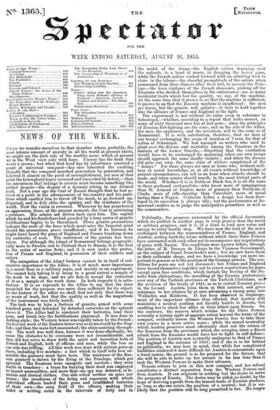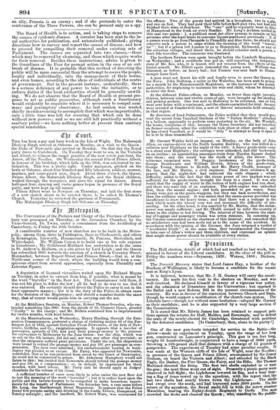Politically, the progress announced by the official documents which we
publish in another page is even greater than the naval or military progress, and it is of a kind to lend new value and energy to every hostile step. We have now the text of the notes exchanged between the representatives of France, England, and Austria, setting forth the terms without which those three Powers have contracted with each other not to recommence any negotiations of peace with Russia. The conditions were known before, through the letter of M. Drouyn de Lhuys to the Viennese Government, on the subject of Count Nesselrode's note ; but we now have them in their authentic shape, and we have a knowledge yet more im- portant to possess as to the position of the German powers. The con- ditions for peace are not yet discussed ; but France and England have bound themselves together not to renew negotiations for peace except upon four conditions, which include the freeing of the Da- nube from obstructions, the annulling of the Russian protectorate over any of the Turkish provinces or the Turkish Christians, and, the revision of the treaty of 1841, so as to curtail Russian power in the Levant. Austria joins them in that contract, and gives substance to her alliance by at once advancing a strong army into Wallachia and Moldavia. It has been observed in disparage- ment of the important alliance thus effected, that Austria still maintains a neutral position not directly hostile to Russia, but enabling her to check her allies in their attack upon Russia. On the contrary, the reserve which retains for the Three Powers severally a certain right of separate action beyond the terms of the compact, evidently leaves the Western Powers free to take their own course in a more active sense ; while the armed neutrality which Austria preserves must effectually shut out the return of the Russians from the provinces which she wimples, since a direct attack from the Russians would force her to fight in self-defence. The position of Austria now is exactly analogous to that of France and England in the autumn of 1853; and if she is so far behind us politically, we may bear in mind, that while her complicated liabilities rendered it more difficult for Austria to concentrate upon a fixed course, the ground is so far prepared for the future, that she will be able to make up her arrears in far less time than it took the Western Powers to make their advance.
Prussia refuses to join in this new compact, and her refusal constitutes a distinct separation from the Western Powers and from Austria. It can originate in nothing but the desire to serve the purposes of Russia. The desire may be aided, no doubt, by the hope of deriving a profit from the transit-trade of Russian produce, so long as she can retain the position of a neutral ; but it is un- likely that the position will be kin; permitted to her, No loam
an ally, Prussia is an enemy ; and if she pretends to enter the conference of the Three Powers, she can be present only as a spy.



























 Previous page
Previous page